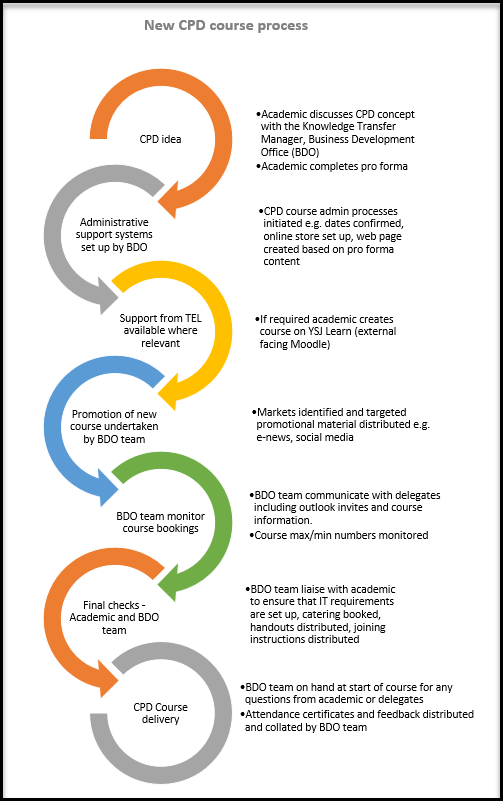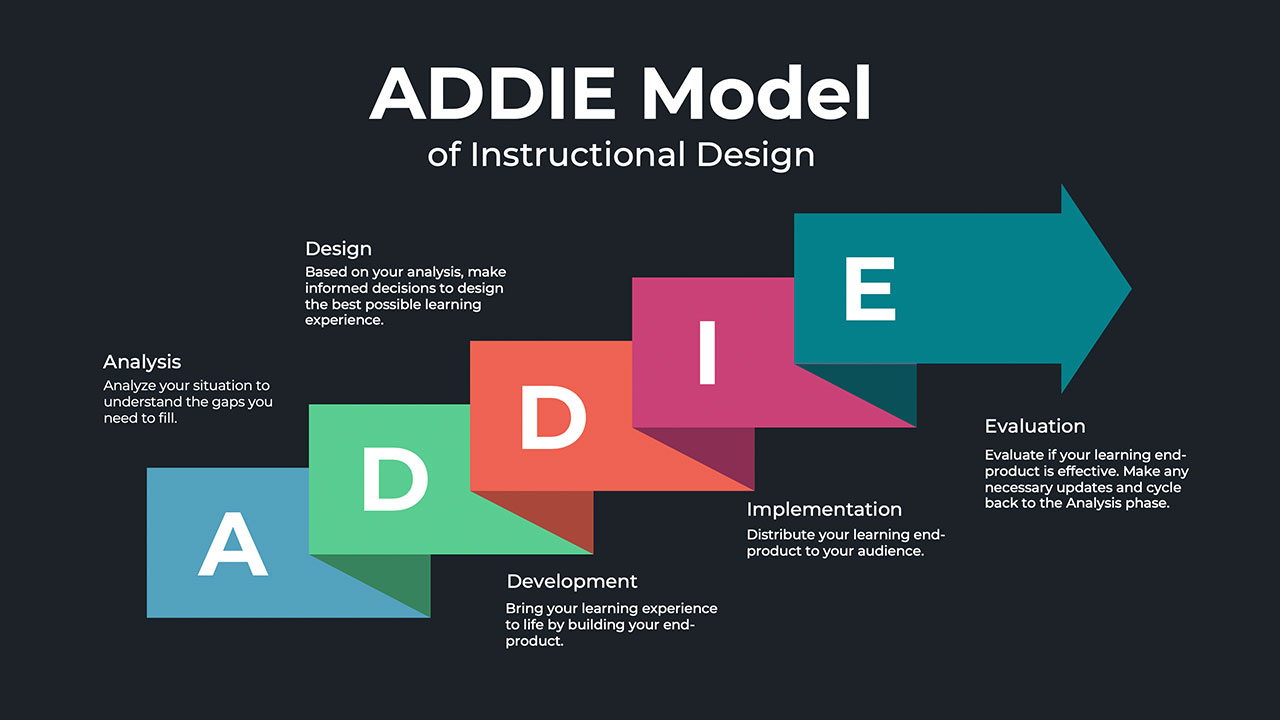Frequently Asked Questions
The platform we use for YSJ Learn is Moodle, and is similar to the platform we use for our undergraduate and post-graduate courses, with many of the same activities, resources and plugins.
If you would like to develop an online course for external partners contact the Business Support team in the first instance with any questions about professional training and development.
Have a look at the 'Course Planning and Design' section in the page below.
The Technology Enhanced Learning (TEL) team are available to support strategic collaborations involving online learning. If you would like support to deliver online learning, we can help in the creation of pedagogically appropriate resources such as the creation of video content and interactive material to encourage active learning.
The TEL team, will be available to discuss your options once you have completed the new course 'analysis' stage (refer to the 'Course Planning and Design' section below).
The Business Support Team will refer you to TEL at that point.
Visit our YSJ Learn web page where you will find helpful guides and information about our Short Course & CPD learning platform.
Steps to a perfect CPD course...how the process works
CPD idea:
Academic discusses CPD concept with the Knowledge Transfer Manager, Business Development Office (BDO)
Academic completes pro forma
Administrative support systems set up by BDO:
CPD course admin processes initiated e.g. dates confirmed, online store set up, web page created based on pro forma content
Support from TEL available where relevant:
If required academic creates course on YSJ Learn (external facing Moodle)
Promotion of new course undertaken by BDO team:
Markets identified and targeted promotional material distributed e.g. e-news, social media
BDO team monitor course bookings:
BDO team communicate with delegates including outlook invites and course information.
Course max/min numbers monitored
Final checks - Academic and BDO team:
BDO team liaise with academic to ensure that IT requirements are set up, catering booked, handouts distributed, joining instructions distributed
CPD Course delivery:
BDO team on hand at start of course for any questions from academic or delegates
Attendance certificates and feedback distributed and collated by BDO team
Overview of CPD training provision
Continuing professional development (CPD) at YSJU describes short or long training provision, which:
- develops employment-related knowledge, skills and understanding, and/or
- is aimed mainly at developing or updating the skills of people already in employment, or in the labour market but not actually employed.
The CPD may, or may not, carry credits. This is known internally as credit-bearing or non-credit-bearing CPD and will affect the assurance process you need to follow.
CPD provision is an integral element of any school’s taught provision portfolio. Whilst the Business Development Office (BDO) support the delivery of all CPD training, Schools are responsible for maintaining a register of all their credit-bearing and non-credit bearing CPD courses and activities.
Please note: it is important that the University has an accurate CPD record for reporting to the Higher Education Business and Community Interaction (HE-BCI) survey which collects financial and output data related to knowledge exchange. As a result, there are some administrative requirements that the BDO office will offer to ensure this data is captured.
Continuing Professional Development (CPD) courses are available either online or in a blended delivery format where possible.
Guidance on the Quality Assurance & Award of Continuing Professional Development Programmes (CPD):
- Accredited CPD credit-bearing individual units/ programmes/ short courses offer academic credits awarded on completion
- Accredited CPD that is non-credit bearing (i.e. the course is accredited by an external Awarding Body) are not awarded academic credit on completion but are nationally recognised qualificiations.
- Non-accredited CPD non-credit-bearing individual units/ programmes/short courses,
Participants who successfully complete a specific number of credits as part of an Accredited CPD credit bearing course should be issued with a University transcript.
Participants who take Accredited CPD that is non-credit bearing, will receive certification of their qualification from the relevant Awarding Body. They will not be enrolled students at YSJU and will be bound by the BDO contract of engagement.
Participants who take Non-accredited CPD courses will NOT receive a transcript. They may receive a simple YSJU certificate of completion from the host School (however, it should be made clear that this does NOT constitute a University award).
These delegates are bound by the BDO contract of engagement.
For any CPD provision, the Course Leader/Director is required to complete the Pro Forma for CPD. This form will ask you to consider all areas of the courses provision. All CPD should be fully costed, prior to approval being given.
Any aspect of risk to the reputation of the University must also be carefully considered at the time of approval. Other areas of consideration included on this pro form include:
• marketing and promotion
• anticipated numbers
• competitor activities
• access to learning resources
• opportunities for eLearning activities
• strategic fit to institutional priorities
In addition, accredited CPD should be approved using the School programme approval process, leading on to Faculty approval where appropriate, in accordance with the University programme approval procedures. Where units are already in existence and part of a cognate programme of study, unit specifications can be submitted using the programme amendment process, focusing on the specific requirements of CPD participants and that particular mode of study.
Where Accredited CPD units/ programmes or short courses are stand alone, brief documentation must be produced, including unit specification and including a contextual statement. This should be approved via the School approvals process.
Non-accredited CPD should be approved by the relevant School. Brief documentation should be prepared, using a unit specification when appropriate and including a contextual statement.
The School must maintain a list of all Accredited and Non-accredited CPD activities performed in the University's name.
Where Accredited CPD comprises of units within cognate programmes, the usual Quality Assurance mechanisms apply.
When Accredited CPD programmes or short courses stand alone, the usual Quality Assurance mechanisms apply.
Non-accredited CPD remain the responsibility of the relevant School and are not subject to formal University Quality Assurance procedures. However, these activities should undergo Quality Assurance checks.
All Accredited CPD is required to have an External Examiner to act as a moderator with respect to assessment.
Existing units currently taught on other programmes may ask an existing External Examiner to fulfil this duty.
All External Examiners are subject to the nomination and appointment criteria detailed in the University's Code of Practice for External Examiners. The following monitoring and review procedures also apply in full:
- A unit survey will be used for each unit.
- Each unit will be subject to continuous monitoring and will be considered within periodic review every 5 years.
- Schools must maintain records of attendees.
The BDO have developed their own approved procedure for the review and monitoring of non-accredited CPD, in line with School procedures. This includes student evaluation questionnaires and a continuous monitoring process. The continuous monitoring process must review the past years activities; reflecting on feedback received and achievement by participants. Action planning for the following year will be undertaken and will reflect on the financial projections compared with the actual outgoings and profits from that year.
Each programme or short course is required to have a Course leader/director who is responsible for handling all teaching material. Course Leaders must also take a register.
Liaison with participants can be managed by the BDO or the School, as appropriate, prior to course commencement in terms of administration, enquiries, enrolment, finances. The BDO will also issues certificates for Accredited non-credit bearing course and for non-accredited courses.
For Accredited CPD that is credit-bearing, the regulations within the University's Assessment Framework apply and marks must be ratified via an Examination Board.
COURSE PLANNING AND DESIGN
You may find it helpful to use an instructional design tool such as ADDIE when creating your learning solutions / content.
ADDIE Instructional Design Tool
Addie stands for Analysis, Design, Development, Implementation and Evaluation.
Use this tool to help coordinate the various steps in course design.
Stages:
Liaise with the Business Development Office (BDO) during the analysis stage.
Analyse the current situation and understand your course goals before you start developing content
Decide on course learning objectives and outcomes
Assess your likely audience - who they may be and their prior knowledge level
Decide if course delivery will be online, face to face or blended
Think about a marketing planand competition analysis
Complete the Pro Forma document provided by the Business Development Office
Seek approval for your short course from your evaluation team / contact
Liaise with the Technology Enhanced Learning (TEL) Team during the analysis stage.
Use your course plan to start designing your course
Think of the course structure, duration, delivery method, assessment and feedback
Liaise with the Technology Enhanced Learning (TEL) Team during the development stage.
Liaise with both the Technology Enhanced Learning (TEL) Team and Business Development Office (BDO) during the implementation stage.
Look at your delivery options - enrolment methods, course length, assessment grading and feedback
Liaise with both the Technology Enhanced Learning (TEL) Team and Business Development Office (BDO) during the evaluation stage.
Getting feedback is vital to improving and revising course content
You can do this within Moodle using the Feedback Tool as your course is finishing
Check that all goals set out in the Analysis phase were met
Use your evaluation report to make changes in current / future courses
For general advice around creating and managing a short course please contact the Business Development Office (BDO)
For pedagogical advice around designing and developing your short course please contact the Technology Enhanced Learning (TEL) team.
Marketing, Advertising & Legal
Create a marketing plan and materials and make your course easy to find online
Find out about any legal requirements on advertising (Competition and Markets Authority compliance). All short courses must comply with consumer protection law. Advertising your course must be clear and accurate.
The Business Development Office can advise but also refer to the government website: https://www.gov.uk/government/collections/higher-education-consumer-law-advice-for-providers-and-students
Ensure that you are not breaching copyright when working with text, images or video.
Refer to the YSJ Library copyright advice pages:
https://www.yorksj.ac.uk/students/library/copyright/
Consider using a case study from a previous learner on your course to attract new learners


